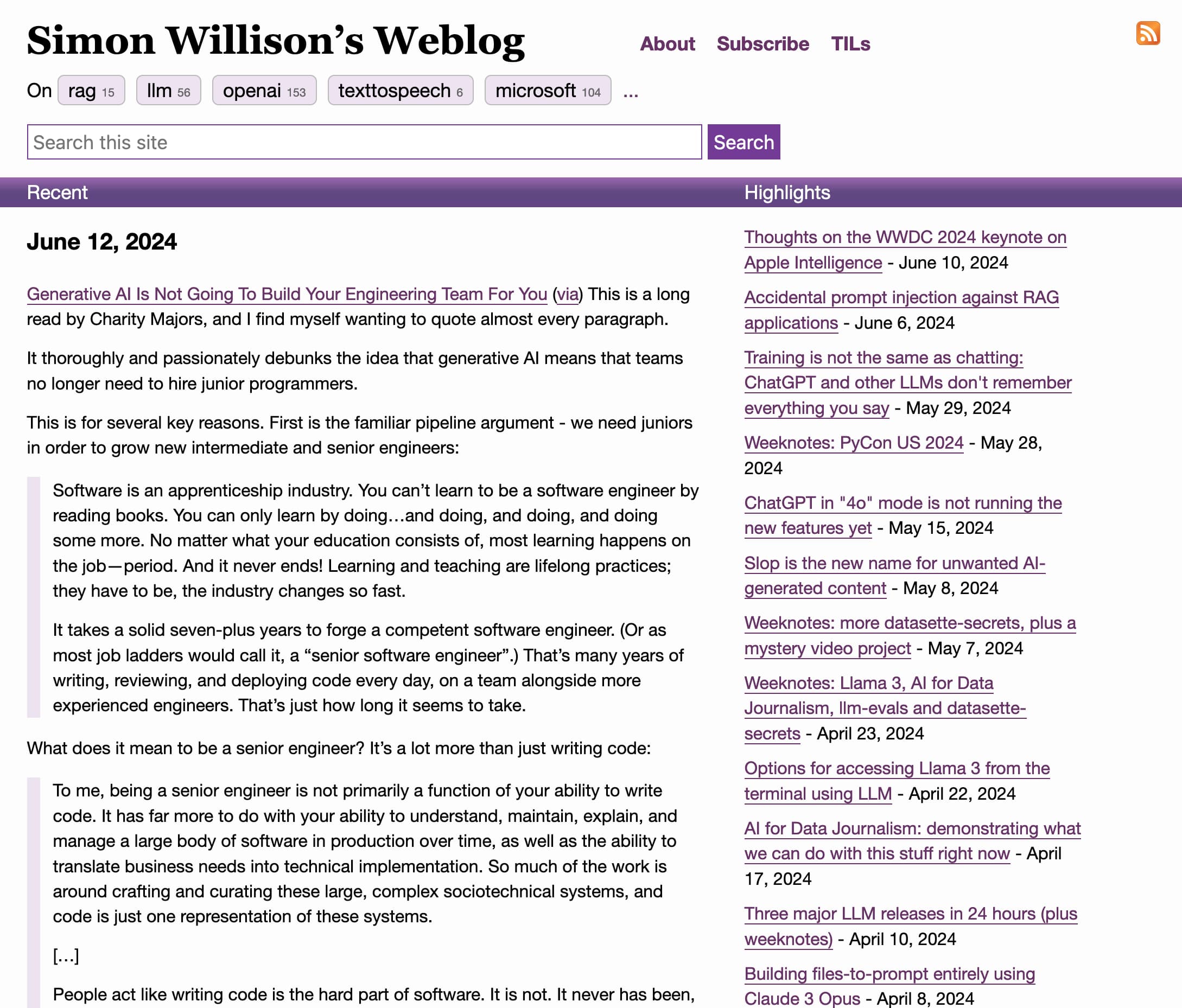Wednesday, 12th June 2024
Generative AI Is Not Going To Build Your Engineering Team For You (via) This barnstormer of an essay is a long read by Charity Majors, and I find myself wanting to quote almost every paragraph.
It thoroughly and passionately debunks the idea that generative AI means that teams no longer need to hire junior programmers.
This is for several key reasons. First is the familiar pipeline argument - we need juniors in order to grow new intermediate and senior engineers:
Software is an apprenticeship industry. You can’t learn to be a software engineer by reading books. You can only learn by doing…and doing, and doing, and doing some more. No matter what your education consists of, most learning happens on the job—period. And it never ends! Learning and teaching are lifelong practices; they have to be, the industry changes so fast.
It takes a solid seven-plus years to forge a competent software engineer. (Or as most job ladders would call it, a “senior software engineer”.) That’s many years of writing, reviewing, and deploying code every day, on a team alongside more experienced engineers. That’s just how long it seems to take.
What does it mean to be a senior engineer? It’s a lot more than just writing code:
To me, being a senior engineer is not primarily a function of your ability to write code. It has far more to do with your ability to understand, maintain, explain, and manage a large body of software in production over time, as well as the ability to translate business needs into technical implementation. So much of the work is around crafting and curating these large, complex sociotechnical systems, and code is just one representation of these systems.
[…]
People act like writing code is the hard part of software. It is not. It never has been, it never will be. Writing code is the easiest part of software engineering, and it’s getting easier by the day. The hard parts are what you do with that code—operating it, understanding it, extending it, and governing it over its entire lifecycle.
But I find the most convincing arguments are the ones about team structure itself:
Hiring engineers is about composing teams. The smallest unit of software ownership is not the individual, it’s the team
[…]
Have you ever been on a team packed exclusively with staff or principal engineers? It is not fun. That is not a high-functioning team. There is only so much high-level architecture and planning work to go around, there are only so many big decisions that need to be made. These engineers spend most of their time doing work that feels boring and repetitive, so they tend to over-engineer solutions and/or cut corners—sometimes at the same time. They compete for the “fun” stuff and find reasons to pick technical fights with each other. They chronically under-document and under-invest in the work that makes systems simple and tractable.
[…]
The best teams are ones where no one is bored, because every single person is working on something that challenges them and pushes their boundaries. The only way you can get this is by having a range of skill levels on the team.
Charity finishes with advice on hiring juniors, including ensuring that your organization is in the right shape to do so effectively.
The only thing worse than never hiring any junior engineers is hiring them into an awful experience where they can’t learn anything.
Seriously though, read the whole thing. It contains such a density of accumulated engineering management wisdom.
A homepage redesign for my blog’s 22nd birthday
This blog is 22 years old today! I wrote up a whole bunch of higlights for the 20th birthday a couple of years ago. Today I’m celebrating with something a bit smaller: I finally redesigned the homepage.
[... 314 words]Contrast [Apple Intelligence] to what OpenAI is trying to accomplish with its GPT models, or Google with Gemini, or Anthropic with Claude: those large language models are trying to incorporate all of the available public knowledge to know everything; it’s a dramatically larger and more difficult problem space, which is why they get stuff wrong. There is also a lot of stuff that they don’t know because that information is locked away — like all of the information on an iPhone.
Datasette 0.64.7.
A very minor dot-fix release for Datasette stable, addressing this bug where Datasette running against the latest version of SQLite - 3.46.0 - threw an error on canned queries that included :named parameters in their SQL.
The root cause was Datasette using a now invalid clever trick I came up with against the undocumented and unstable opcodes returned by a SQLite EXPLAIN query.
I asked on the SQLite forum and learned that the feature I was using was removed in this commit to SQLite. D. Richard Hipp explains:
The P4 parameter to OP_Variable was not being used for anything. By omitting it, we make the prepared statement slightly smaller, reduce the size of the SQLite library by a few bytes, and help sqlite3_prepare() and similar run slightly faster.
